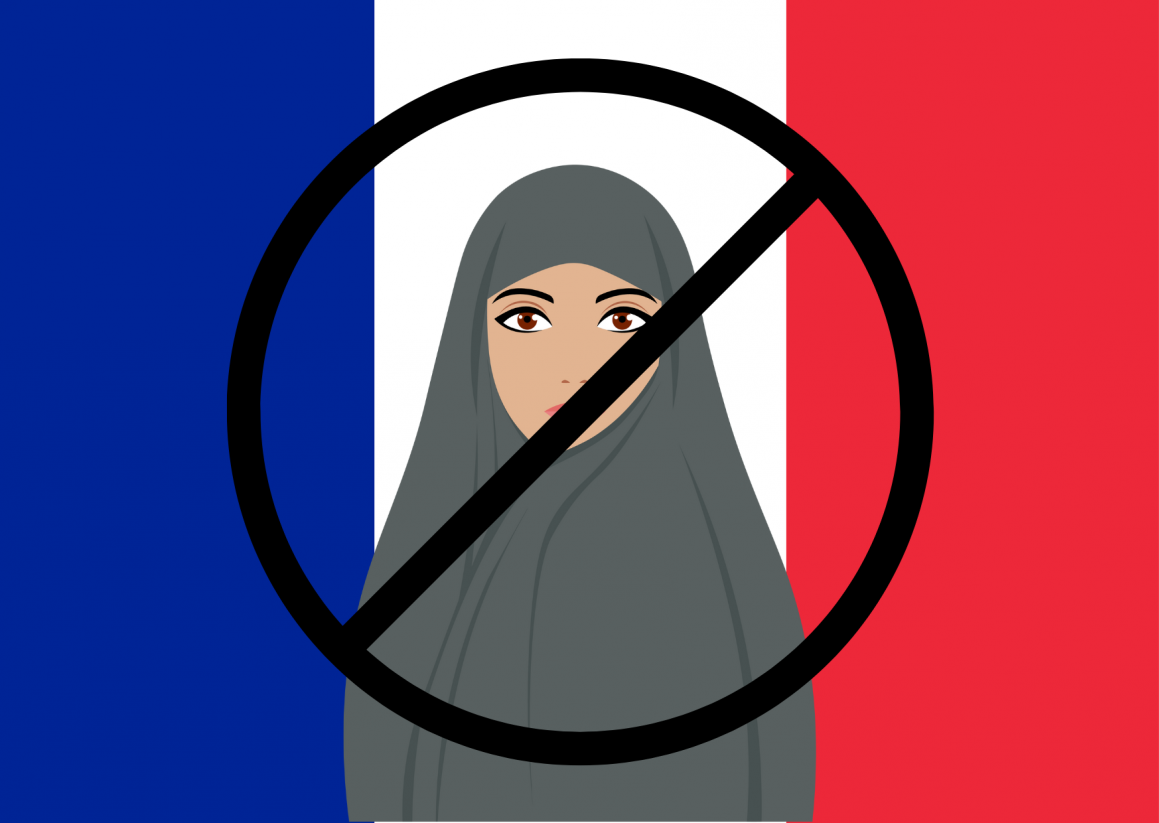
When oppression is the new wave of feminism: France’s abortion enshrinement and Hijab ban
By Reyam Jamaleddine, April 11 2024—
On International Women’s Day 2024, France became the first country in the world to enshrine abortion into their constitution. The vote was 780-72, making the passing of this constitutional change overwhelmingly agreeable by the French parliament. This political move is triumphant for women; it sets a precedent across the globe for women’s rights and the continual fight for women’s bodily autonomy.
Before parliament voted on the passing of this legislation, Prime Minister Gabriel Attal said “We’re sending a message to all women: your body belongs to you and no one can decide for you,”
In the aftermath of the passing of this legislation, the Eiffel Tower was lit up with the message “My Body My Choice”. Similarly, several French feminists were voicing their thoughts on the law passing, citing the words of French philosopher and feminist Simone De Beviouir who was and continues to be a pioneer for Western feminism.
“It’s Simone de Beauvoir who said that women’s rights were the first freedoms to be attacked,” said Yanna Antigny-Fernandes.
This groundbreaking legislation serves as a beacon of hope for women globally. It is positioned in contrast to the United States Supreme Court’s decision to overturn Roe v. Wade in 2022, making the right to abortion no longer a constitutional right in the United States. This powerful and deliberate move by France is a precedent that is now set for other neighbouring countries to follow suit. This enshrinement of women’s rights in France posits the nation as a feminist state that not only cares. but acts upon the continual fight for women’s rights.
This, however, is the loudest and most obnoxious occurrence of cognitive dissonance.
France has been actively in the pursuit of damaging the rights of women for over two decades. In 2004, France implemented an all-encompassing law where individuals cannot wear religiously symbolic pieces, this specifically affected the young girls who would wear hijabs at public schools. In 2010 France banned all face coverings including the Niqab which is worn by Muslim women who choose to wear it. In 2023, France imposed a Hijab ban for the nation’s competitive athletes looking ahead to the 2024 Olympics. Similarly, in 2023 France banned the Islamic dress known as the Abaya from being worn in school.
The implementation of these laws is stated to be with the intent of the creation of a secular society, however, in this pursuit, the rights of Muslim women have consistently been infringed upon. To reiterate, Prime Minister Gabriel Attal said “We’re sending a message to all women: your body belongs to you and no one can decide for you,” Yet, Attal has been making the choices and decisions for Muslim women who live in France. Women in France do not have the choice to veil or wear their cultural garments.
The Abaya is a long, loose-fitting garment that women in the Middle East and North African regions typically wear. It is a cultural piece of clothing that aligns with the religious requirements of the Islamic Hijab. The Abaya is akin to a maxi dress, a robe or even a long cardigan. They appear in an overwhelming diversity of styles, colours and patterns. Recognizing these features of the Abaya means that a woman could choose to wear a Batman cape and it would achieve the same results as wearing an Abaya. It is distinctly apparent that the Abaya is banned not for its modesty-founded nature or how it presents the women who wear them, rather it is banned because it is a piece of clothing that Muslim women choose to wear. The common theme that has been prevalent in France is that Muslim women do not have a choice in how they can dress up their bodies, leaving their bodily autonomy up to the French regime.
The so-called secular and French ethnocentric culture that France has been imposing on the nation has marginalized the minorities of the nation in significant and harmful ways. It seems as if secularism or Laïcité is the vindication of discrimination. Constant assumptions about why young girls veil and if they have been forced and oppressed in this ritual are created by White people who have saviour complexes. This idea of the secular French identity and its ability to save oppressed Muslim women is a paradox, the secularism and infringement on the bodies of Muslim women is what oppresses women.
The current approach to the French regime is systematic, as intolerance is deeply rooted in the cultural and historical foundation of the nation. The violation of the Muslim community by the French people isn’t novel, rather it is the carrying on of France’s imperialism in the Middle East and North Africa, especially that of Algeria, Morocco and Tunisia. Muslim women are the forefront symbols of the Islamic faith and this is apparent through their approach to how they dress their bodies. The French have taken two steps back with one foot, the blatant Islamophobia and flagrant oppression of women in their nation has further established a facet of cruelty and intolerance.
The newly founded enshrinement of the right to abortion in the French constitution is a triumphant victory, seemingly implemented with only the real French women in mind. France must address and act upon their infringement on human rights and women’s rights in regard to what women and girls can and can’t wear.
France is far from being a feminist-friendly state or operating a women-forward governing body. Human rights and women’s rights do not just apply to a group with a specific ethnicity, background or religion, they apply to everyone. France has violated this principle and will continue to be an oppressive state should it continue to impose veiling bans on women and girls.
This article is a part of our Voices section and does not necessarily reflect the views of the Gauntlet editorial board.
